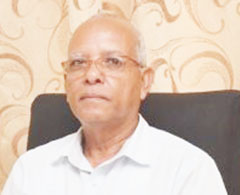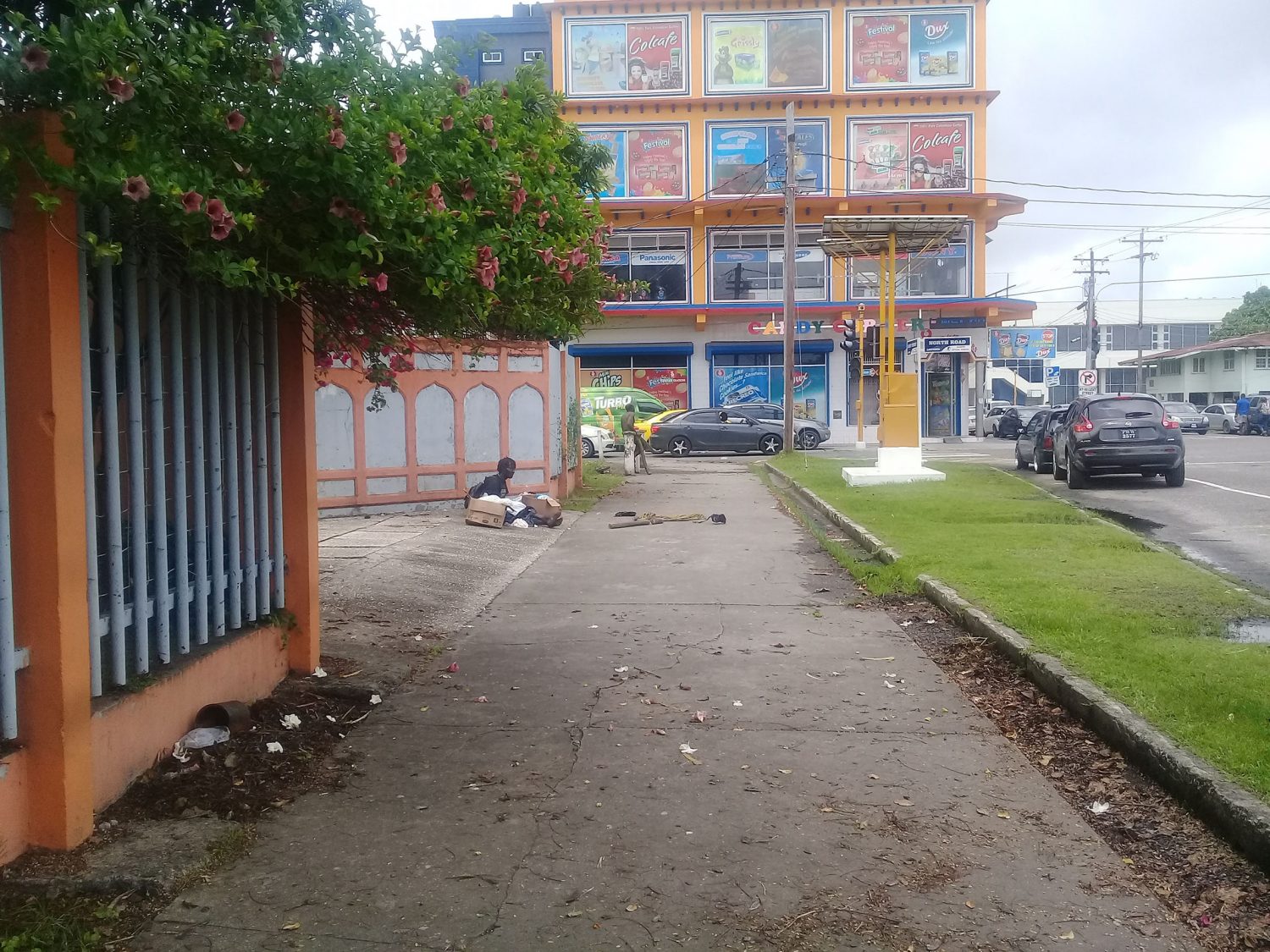It is an early mid-morning and 50-year-old Andrew Allen is calmly removing the copper from small pieces of electrical wire, which he plans to sell. It is a painstaking task and it is obvious that it will take a while, but he continues anyway.
“I usually sell it for $200 a pound and sometimes I just get half a pound so is $100 I would get,” he told the Sunday Stabroek when approached as he sat on the pavement at the corner of Camp Street and North Road.
He does not look up from his task as he speaks freely to this newspaper.
Allen shared that he also works in the vicinity of the Bourda Market with vendors and he makes a “little money.”
Allen has been living on the streets for the past 12 years since he was deported from the United States for the offence of being in possession of an illegal firearm.
“I don’t have no relatives here,” he said. “Sometimes my brother from overseas would come and look for me…”
Asked if he had ever visited the Night Shelter, Allen responded in the negative and asked for the location. But when it was given to him, he said it was “too far.”
“And what they have there?” he enquired, though he seemed not too keen on hearing that he would have somewhere to sleep at night. “I need somewhere with a job programme to help me find a job, that is what I need,” he answered, still gathering his copper wire.
There are many like him living on the streets of Georgetown and there seems to be no clear programme geared at addressing what is a growing problem.

There seemed to be some hope when the National Task Force Commission (NTFC) for the Rehabilitation, Restoration and Renewal of Guyana had announced initially that part of its mandate was to relocate the homeless, addicts and the mentally ill from the streets.
In fact, its brochure does state welfare management of the homeless and addicted as part of its mandate but according to Head of the NTFC’s secretariat Dr Sewnauth Punalall the commission is responsible as far as unencumbering of busy streets by street dwellers, but does not have the personnel to deal with their removal and management. This task, he said, falls to the Ministry of Social Protection.
Former chairman of the NTFC Major General (rtd) Joseph Singh, who is still to be replaced since he stepped away from the voluntary position, had announced that when the Hugo Chavez Centre at West Berbice was up and running the commission would have worked closely with the Ministry of Social Protection to see how many persons could have been relocated there.
A pilot programme was expected to be carried out in Georgetown, which would have informed what happened in other areas.
More than 90
According to Punalall, the programme was held and more than 90 persons were picked up and taken to the compound of the Georgetown Public Hospital (GPH) where various professionals dealt with them. He said some were treated and reintegrated into their families, but others returned to the streets.
Those who were sick were referred to the GPH for treatment and some were hospitalized after screening. It was found that some had been abandoned by their families because they were sick, while others wanted to live on the street; and then there were those who were mentally ill. There were also some persons who were just too poor to find a home of their own.
This is the case of Allen and another street dweller who declined to give her name. They both expressed the need to find a job and somewhere to live but found it difficult to rid themselves of the of hard-knock life.
“You think I want to live on the street? Is can’t help mek I deh hay, nobody have no time with me,” the woman answered when asked about living on the street.
She said she has been on the streets “for years” but wanted to a “place to live.” As expected she was dirty and disheveled, but like Allen did not appear to be hooked on any substance.
Punalall said they also found those who were on the streets for “commercial purposes” and there were those who were criminally minded. The latter two groups may have gotten caught up because the programme was executed during the night and they would have removed themselves during the day unlike Allen and many others who do not have that option.
A follow-up survey done with street dwellers this year found that there was a slight decrease in the numbers, but unlike last year there was no real intervention aimed at removing them. The survey was done over a three-day period during the evenings and the numbers varied on dfferent days. The survey was a collaborative effort by the Ministry of Social Protection and the Mayor and City Council.
“The problem has been a lingering one,” Punalall said. “We need to find a location, probably outside of Georgetown [to accommodate the street dwellers].” He said that the Ministry of Social Protection was looking into this.
He pointed out that while there are vagrants there are also vendors who spend most of their days and nights on the streets. He gave the example of a man who had built a shack on a busy corner. It was broken down and removed, but a few days later the man rebuilt the shack and was back in it.
For him the problem is more complex than how it is seen which includes the street dwellers becoming resistant when attempts are made to remove them.
This might be the case even with Allen as he indicated that he is not keen on being in a shelter, but rather wants to be helped with a job so that he can start taking care of himself
Asked where he sleeps at night, Allen, his head still bent, said quietly “on the streets.” As to whether he has friends, he raised his head in the direction of another street dweller and answered, “Look one right there.”
His friend was lying on the pavement and he appeared to be weak at the time. While Allen was dressed in a jersey and pants—albeit soiled—his friend wore only short pants; neither had any footwear. Shortly after this newspaper started to speak with Allen, his friend got up and hobbled off, leaning on a stick.
A carton sat in front of Allen and I asked if it contained his possessions. Without answering, he emptied the box item by item, it contained a few pieces of clothing, a pair of ladies’ shoes, some empty plastic bags and a few other items that did not appear to be functional.
“No, I was never married but I have four children,” he said when asked if he had a family.
He knows the names of his children but has not seen them since he was deported 12 years ago.
Looking for a chair
The commission has been in search of a chairperson, in the meantime, it is made up of the secretariat head and representatives from the agencies that represent the five areas it covers. Apart from the issue of the homeless and addicted, the NTFC is also mandated to address drainage, solid waste management and derelict vehicle removal, traffic management and sustainable urban physical structure.
However, Punalall explained that the commission is merely a coordinating unit rather than an executing entity.
“We gather information then channel it to the appropriate agencies and ministries for actions to be taken,” he said adding that they work in areas such as the sugar estates and would examine the infrastructure that needs improvement so that people’s livelihoods can be improved.
Once this is done then the information is passed on so that these issues can be addressed.
One of the highlights of the commission’s work was the visits of a team of engineers from the Netherlands, which did some detailed work looking at the drainage in several areas in Guyana. They compiled a report, and this is being acted on by the relevant authorities.
The commission is also overseeing the construction of a derelict dump site at Kuru Kururu which is a project it received a budget for. It is also 90% completed and is expected to be ready by year end. This site, it is expected, will accept the many old vehicles removed from the roadways. The secretariat head pointed out that some of the vehicles are on reserves and post a danger to society. It is a pilot project for Region Four and could be replicated in other areas.





